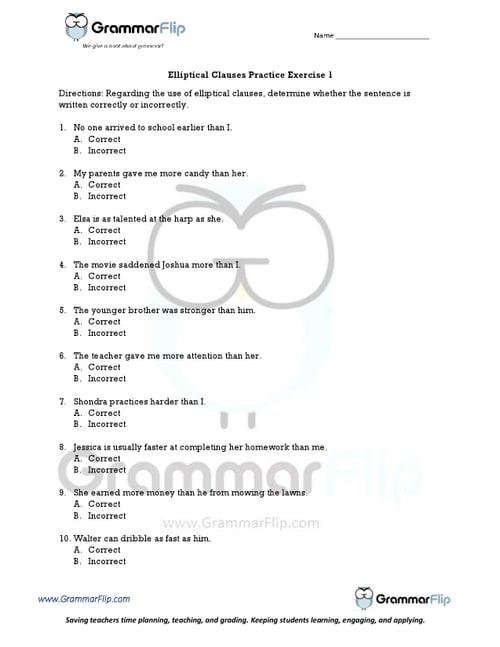What is an Elliptical Clause?
An elliptical clause is a type of dependent or subordinate clause in which some words have been omitted, but the meaning is still clear from the context.
Some examples of elliptical clauses would be the following:
Harriet has more musical training than Taylor.
No one ate more sugar cookies than I.
Jasmyn’s brother was more excited to go to the football game than she.
The pop quiz did not worry my classmates as much as me.
My dogs are jealous that the new kitten is getting more attention than they.
Long-Form Video: Elliptical Clauses
Long-form instructional video lessons allow students to engage with grammar concepts in more depth and detail.
This format provides students with a stronger foundation and a more comprehensive understanding of elliptical clauses.
A Closer Look at Elliptical Clauses
Elliptical clauses are a more efficient means of getting your point across. They are an abbreviated version of what your sentence really is. Let’s look at a few examples:
Elliptical Clause: No one played more minutes in the game yesterday than I.
Long Form: No one played more minutes in the game yesterday than I (played in the game).
The actual elliptical clause is “than I,” but what we are really saying is “than I played in the game.” We are simply shortening our subordinate clause down to an elliptical clause. Let’s try another example with an elliptical clause:
Elliptical Clause: Jasmyn has more trading cards than Walter.
Long Form: Jasmyn has more trading cards than Walter (has trading cards).
Again, notice that the elliptical clause is simply a shortened form of the subordinate conjunction. There are words omitted, but the reader still understands the meaning of the sentence.
Download a Free Worksheet on Elliptical Clauses!
Click the image below to download your free worksheet on elliptical clauses!

In search of a grammar and writing program for your high school students?
Explore More GrammarFlip Lessons!
Parts of Speech lessons provide the building blocks of grammar. GrammarFlip covers these topics in detail to ensure a solid foundation is built. First time learners and students seeking to review the parts of speech can both benefit from the instructional videos and slide show reviews.
Parts of the Sentence lessons are critical for understanding how the parts of speech function in language construction. From the basic to the advanced, these lessons will cover a wide range of grammar topics that can be used in any grade level or classroom.
Mechanics and Usage lessons equip students with the necessary skills to communicate clearly to all audiences. With a focus on the application of these concepts in student writing, these lessons tie together both simple constructions of grammar as well as the more complex such that any age or skill level of student will benefit.

